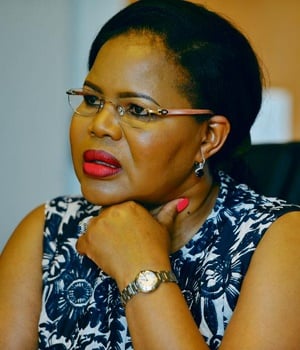
Ten years into her tenure as NEF head, Philisiwe Mthethwa wants more support from black CEOs
National Empowerment Fund (NEF) chief executive Philisiwe Mthethwa regrets telling government not to give its R2.4 billion in recapitalisation back in 2009, as it continues to struggle to meet its mandate to fund BEE transactions.
Back in 2009, the NEF, a government vehicle with an exclusive mandate to fund BEE deals, found itself in a good financial position after raising more than R2 billion following the sale of half of its 3% stake in MTN to the Asonge Share Scheme.
The NEF, which had been promised R10 billion over five years from 2004 to 2009 as funding from the department of trade and industry, told the department to keep its 2009 allocation of R2.4 billion, as business was good.
Although Mthethwa says they are close to a deal with state authorities to allocate the remainder of the tranche, “or whatever government can”, she wishes the NEF board had never passed on the allocation.
The fund celebrated 10 years since receiving its first tranche in 2004 and has helped to create many BEE success stories along the way.
Mthethwa, who has spent a decade as CEO, says no other entity can boast of black industrialists in the BEE space as much as the NEF can, but it needs more money now.
“Looking back, if there was anything I could have done differently, it would have been around that recapitalisation of the NEF.
“That was maybe a wrong move or decision on our side, but we didn’t want to continuously sit on this pile of cash when there were other entities in government that required the funds,” said Mthethwa, whose entity now boasts of black-owned companies in tourism, construction, energy, engineering, cement and pesticide manufacturing.
Since 2009, the NEF has been self-funding and has approved more than 688 transactions worth upwards of R6.6 billion.
Mthethwa does not want to dwell on the challenges too much, preferring to pose hard questions of black professionals who were not entering the business space.
She is proud of companies such as the Motheo Construction Group, a female-led company that began with a Construction Industry Development Board grading of only level 3 but, with the NEF showing the way, has increased its rating to the highest in the industry, having built more than 75 000 homes.
She says the only reason BEE has not reached its full potential is because black people have not put their energies into the project.
“I believe the reason it hasn’t worked is we have not really put our energies and intellectual capabilities as black professionals into ensuring this BEE project works in the long term.
“For as long as we have this anomaly in this country where you have 90% of the people of South Africa owning 5% of the economy and 10% owning 90% of the resources, I don’t think this is a sustainable way of supporting our democracy.
“It’s a recipe for disaster,” said Mthethwa.
Having spent the longest time in the BEE space, and being the first to refer to the term “black industrialists” more than five years ago, Mthethwa says few people know the pitfalls of BEE better than those at the NEF.
“All I’m saying to South Africans is, here is an entity that has a track record; if we were to just give it ... it’s very easy for South Africans to invest R1 billion in one white-owned business. If you give the NEF R1 billion, we slice it up and it empowers hundreds of enterprises, small and big,” said Mthethwa.
She is at pains when talking about black professionals in huge industries who do not uplift black companies by giving them work.
“South Africans don’t realise we are literally sitting on gold, but we just can’t take this gold. It’s frustrating.
“The change we make by giving a cleaning contract to a black female-owned entity [is far-reaching] – as CEOs we can take those decisions, but do we take them? How many black CEOs would worry about that? You can’t only be thinking about big things. Bidvest is a multibillion-rand business and they are into cleaning, leisure and tourism. Those are the low-hanging fruits for me,” said Mthethwa.
The NEF, she said, has now taken up government’s challenge of creating black industrialists with a Special Projects Fund, a portfolio of projects worth R27 billion expected to create about 80 000 jobs.
“We fund black industrialisation and we want black people to be involved in the services-related industries as well, which are a big moneymaker and job creator.
“Black people should be well positioned in all of the critical sectors of the South African economy, even if they fall outside of the manufacturing sector.
“Tourism is a low-hanging fruit for me. You can be in the tourism sector and still make it,” said Mthethwa.




 Publications
Publications
 Partners
Partners








